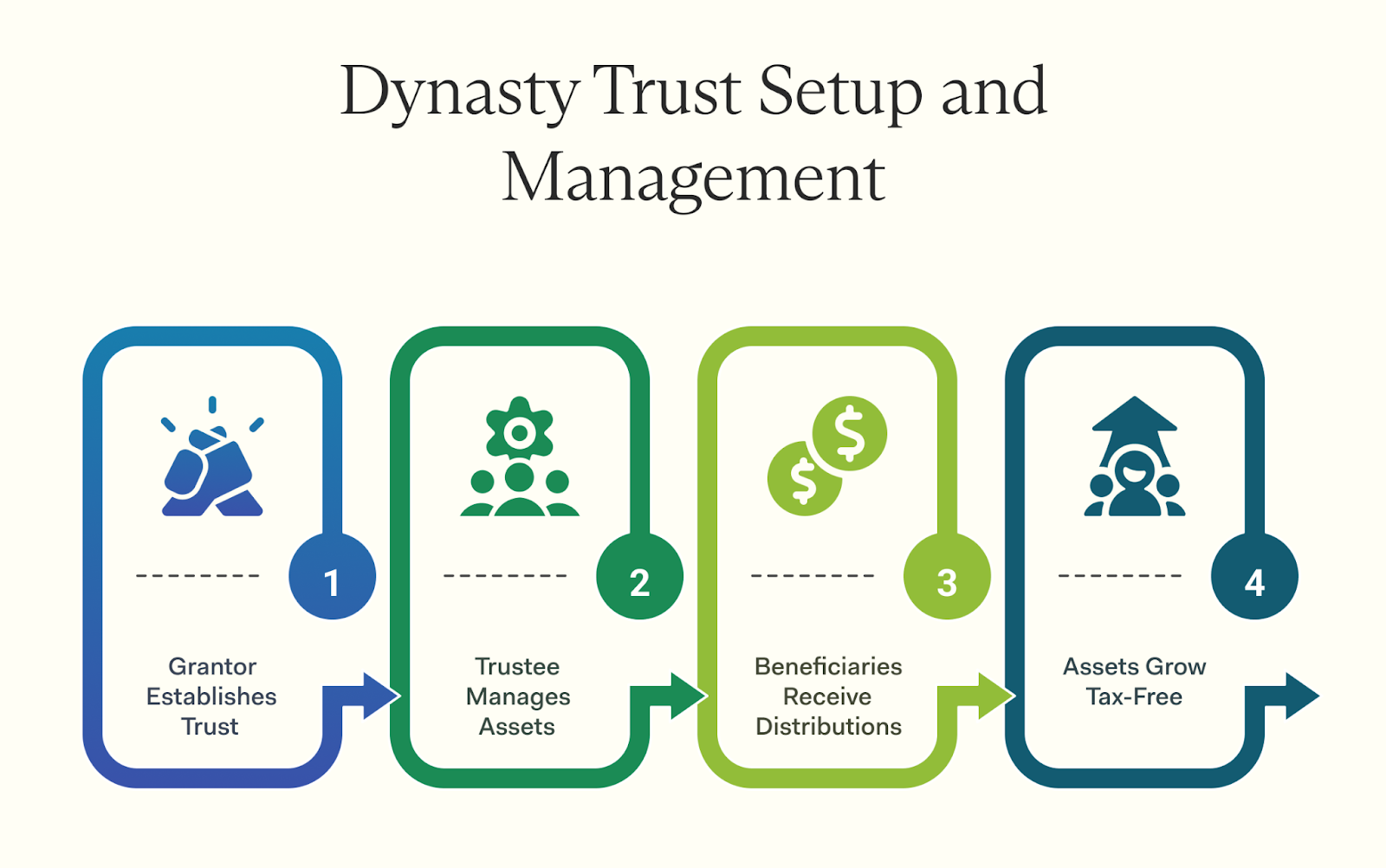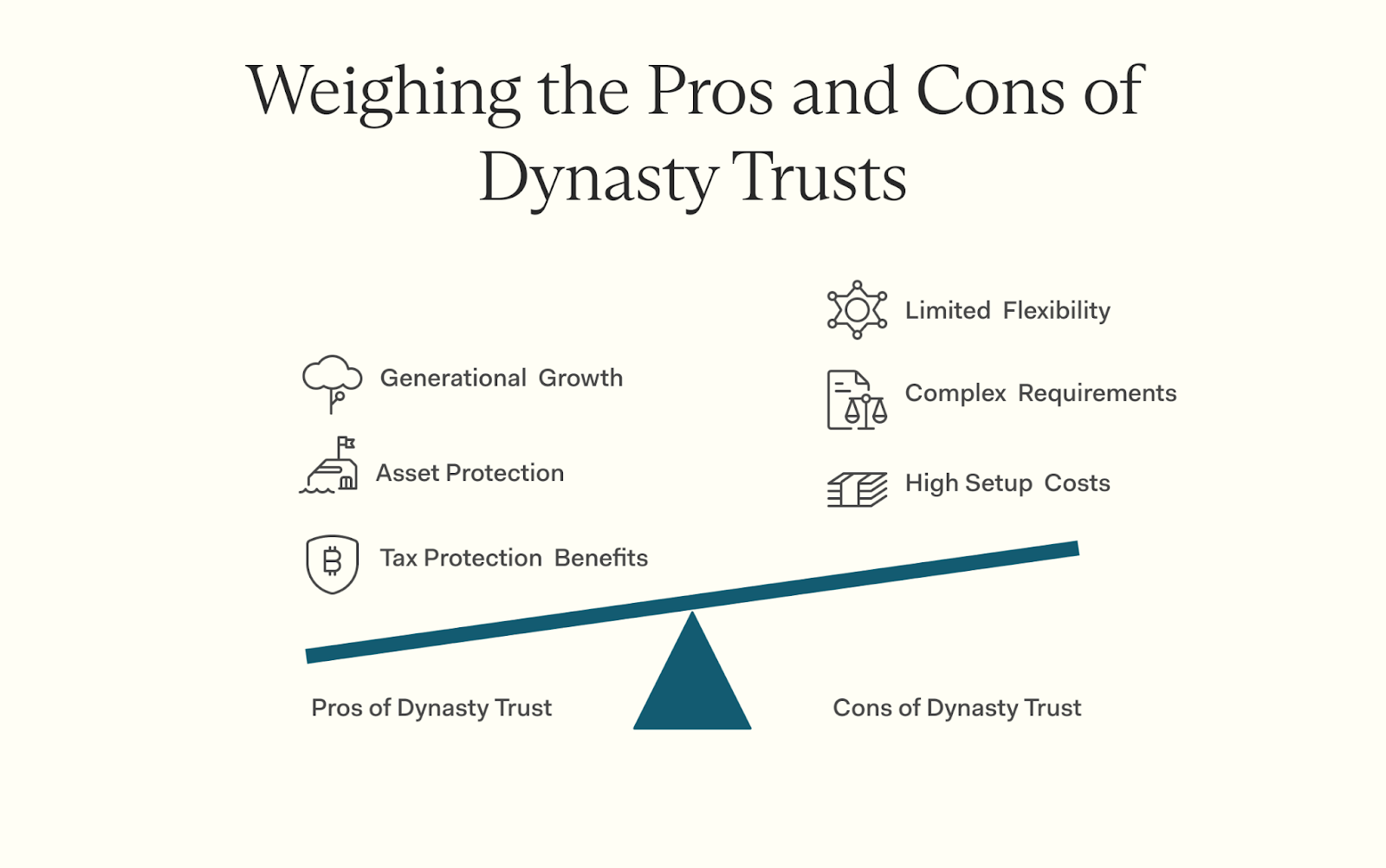Explore the benefits of a dynasty trust for preserving wealth across generations. Discover how it can safeguard your family's financial future.
Want to protect your wealth for future generations? Consider a dynasty trust.
This kind of trust helps families transfer assets over multiple generations without big tax hits or legal troubles. Dynasty trusts avoid estate taxes that can significantly reduce inheritance. They move assets out of your taxable estate, potentially saving lots of tax money long-term.
This blog explains how a dynasty trust works and helps you see if it's a good choice for you. We'll cover how to set one up, trustee roles, and the pros and cons.

Dynasty trusts help families pass wealth to future generations, strategically minimizing exposure to estate taxes or generation skipping transfer taxes with proper structuring and utilization of applicable exemptions. This trust lasts through many generations, protecting and growing family wealth over time.
By strategically using the lifetime gift tax exemption and GST tax exemption, which are subject to changes and set at $13.61 million per individual until December 31, 2025, significant assets can be effectively moved out of your estate. As a result, these assets grow tax-free, shielding them from creditors and divorce settlements.
Dynasty trusts offer tax benefits and protect wealth from external threats across multiple generations.
By setting up a dynasty trust correctly, families can avoid federal estate tax and GST tax for many years. The Internal Revenue Service sets rules for how to manage these trusts for income tax purposes.
Working with an estate planning attorney is crucial because they know these complex laws well. Estate planning keeps business interests and other assets safe within the family for great grandchildren—and beyond.
How Does a Dynasty Trust Work?
Decide on the assets to place in the trust, including cash, real estate, or investments, while considering the liquidity and management complexities of certain assets, especially real estate, which may require additional oversight.
Select a trustee to manage the trust's assets. An independent trustee, whether a trusted family member or a professional from a financial institution, is advisable, as the grantor cannot serve as the trustee without potentially facing adverse tax consequences.
It is crucial to design the dynasty trust with any necessary flexibility at the outset since it is typically irrevocable and cannot be easily amended or revoked once established. This foresight helps accommodate changing family needs or tax laws over time.
Trust funds can grow with tax benefits over time, though assets are still subject to income taxes unless specific strategies are implemented to mitigate this liability, thus offering potential tax savings for high net worth families.
General Note:
The content provides a general overview of dynasty trusts. However, given the complexity and variability of tax laws, it's essential to consult with a qualified estate planning attorney or tax professional to tailor strategies to individual circumstances and ensure compliance with current regulations.
Dynasty trusts begin when someone moves their wealth into the trust, then a trustee takes over to manage and grow the family's assets.
Establishing a dynasty trust is crucial for preserving wealth. This process involves careful planning and legal steps.
Following these steps helps create an effective tool for generational wealth and asset protection.
The trustee plays a key role in a dynasty trust. This person manages the trust's assets after the grantor dies. The trustee is responsible for distributing these assets to beneficiaries.
They also handle tax considerations, such as minimizing estate taxes and managing generation skipping taxes.
Trustees must follow state law and act in the best interest of beneficiaries. They protect family wealth from creditors or divorce claims by keeping assets separate. Often, families choose a corporate trustee or a trusted individual for this job.
A good trustee ensures financial security and careful asset management for generations to come.
Assets in a dynasty trust are passed down to future generations. This ensures that wealth remains intact for years. An irrevocable trust protects these assets from creditors and divorce claims, raising the family's financial legacy.
The trustee manages how and when assets are distributed. They follow specific rules set in the trust document.
Trust funds are subject to income taxes but can be structured in ways to minimize this through tax-efficient investments, offering potential tax savings for high net worth families. The goal is to preserve wealth while managing estate taxes efficiently. This strategy helps families manage taxable gains more effectively.

Dynasty trusts keep your family's wealth safe for many years. They can protect assets from creditors and divorce, too. Plus, they may offer tax benefits. Want to learn more about how they work?
Dynasty trusts help keep family wealth safe for many years. This kind of trust can pass down assets from one generation to the next. While the assets can grow without incurring estate taxes at each generational transfer, it's important to note that they may still be subject to income taxes on generated income.
Wealth grows tax-free within the trust, allowing it to increase over time.
Creditors or divorce settlements won't easily touch these assets either. Immediate beneficiaries enjoy financial security without losing their share due to outside issues. A good plan with tax advisors ensures that your family's wealth stays intact and protected through generations.
Beyond preserving wealth across generations, dynasty trusts also provide protection from creditors and divorce. The trust helps shield assets from a beneficiary's creditors.
If someone faces financial trouble, the trust keeps their wealth secure.
Divorce can drain finances quickly too. With a trust, assets stay within the family. This means they can't be divided during a divorce settlement. Though commonly referred to as allowing for tax-free growth, assets in these trusts can grow without estate taxes but still may be subject to income taxes; planning is crucial for high net worth individuals seeking to minimize taxes while keeping their heirs protected.
Administrative costs may arise, but many view this as worth it for peace of mind on protecting family wealth.
A Dynasty Trust can offer important tax benefits. It allows assets to grow without estate taxes, although they are still subject to income taxes on generated income. This aspect helps keep more money for future generations. The trust can also minimize taxes on asset distribution, making it efficient for your family.
Using a trust company to manage the assets adds another layer of protection. Creditors and divorce settlements often can't touch the funds in a Dynasty Trust. These features help ensure that wealth stays within your immediate family over time.
If wealth is not managed properly, this could lead to unintended tax liabilities, such as failing to comply with generation-skipping transfer tax (GSTT) regulations, which could result in significant taxes.
Once set up, the rules of a dynasty trust are strict. While beneficiaries may face restrictions on access, some trusts allow for discretionary distributions which provide beneficiaries with some level of flexibility under certain conditions.
Dynasty trusts can be complex and costly to set up. They may also limit how beneficiaries use their inheritance, which can feel restrictive for some families.
Setting up a dynasty trust can be intricate. It often requires skilled professionals, like lawyers and financial advisors. Their fees add to the overall costs. These expenses can accumulate quickly.
Ongoing management also needs attention—trustees must handle investments and keep records updated. This may mean more costs over time.
The rules around these trusts can change too. New laws might affect how assets transfer or taxes apply. Families should prepare for this uncertainty, as it adds another layer of intricacy.
If wealth is not managed according to specific regulatory and tax requirements, such as those related to generation-skipping transfer taxes, there could be unforeseen tax liabilities that may interfere with the objectives of tax-efficient growth.
Beyond the complexity and high costs, dynasty trusts limit how beneficiaries can use their assets. While the dynamics of the trust are preset and generally rigid, the specific level of flexibility for beneficiaries to access funds can vary, depending on the conditions established by the grantor, which might allow for discretionary distributions under certain circumstances.
This can be tough if they need money for urgent expenses.
Assets transferred into the trust stay under tight control by the trustee. While this protects wealth from creditors and divorce, it may not suit everyone's needs. Some beneficiaries might want access to their inheritance sooner rather than later.
The lack of flexibility can create frustration among family members who expected different outcomes from their share of the assets passed down through generations.
A dynasty trust can be a powerful tool for preserving family wealth. It provides asset protection and potential tax advantages as wealth passes through generations. You've seen how these trusts work, from establishment to trustee selection and asset management.
The benefits are substantial—protecting wealth from creditors, divorce claims, and certain tax liabilities. However, consider the drawbacks carefully, including setup complexity, ongoing costs, and restrictions on your heirs.
Before deciding, consult with qualified professionals to determine if a dynasty trust aligns with your family's long-term financial goals.
A Dynasty Trust is an estate planning tool used to pass wealth down in a tax-efficient manner, allowing for tax-free growth and minimizing taxes.
The assets in the trust can grow over time, but they are subject to income or capital gains taxes on any income they generate, intervening to preserve more of your wealth within your family line while minimizing estate and gift taxes.
Yes, if preserving wealth and passing it on in the most tax-efficient way possible is important to you, then setting up a dynasty trust might be right for you, especially if you have substantial assets that justify the costs and complexities involved in establishing and maintaining such a trust.
While offering significant benefits like minimizing estate and gift taxes, establishing such trusts may involve complex legal processes, high costs, and could limit beneficiaries' access to funds due to strict distribution rules. Additionally, the irrevocable nature of the trust means that once the assets are transferred, the grantor loses control over them.